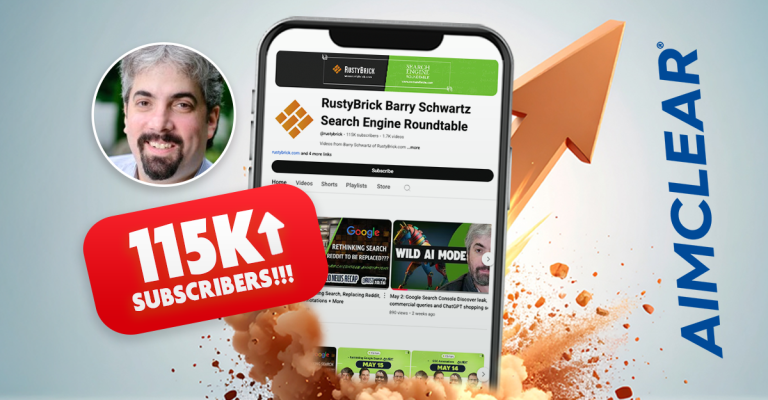 Over the last 10 months the number of PPC accounts AIMCLEAR handles has multiplied by more than 20X, which has been seismic to say the least. At the same time the ever-evolving PPC landscape continually undergoes its own “global warming crises,” as heated paradigm shifts pile upon chilling conceptual overhauls at the advertising platform level.
Over the last 10 months the number of PPC accounts AIMCLEAR handles has multiplied by more than 20X, which has been seismic to say the least. At the same time the ever-evolving PPC landscape continually undergoes its own “global warming crises,” as heated paradigm shifts pile upon chilling conceptual overhauls at the advertising platform level.
Any search marketing agency handling small, let alone voluminous, PPC accounts knows the serious challenges. Reporting, billing, conducting multivariate ad message/landing page testing, conversion tracking, making analytics actionable, communicating with the client, and dealing with monthly cash flow makes any PPC intense- if not daunting.
Obstacles the small SEM shop encounters, when scaling to big PPC management operations at the portfolio level, can make for stormy afternoons.
First, the Solution
Straight up front, the solution for us was to research, build, and deploy a suite of API based PPC management tools comprised of both commercial and internally built applications. As a small SEM shop, handling about a million bucks in annual PPC-spend, we did it in self-defense. Absent automation, the human PPC account manager never has time to focus on the really important (and fun) stuff: messaging, landing pages, creativity, high level strategy, interacting with the client, and tactics.
Enterprise PPC by Hand Is Impossible
Hell, even small PPC management by hand is impractical. “Head” keywords (short tail) have become expensive ROI killers as everyone slugs it out for the same keywords. Over 20% of queries typed into Google each day have never been searched on before (Staggering but true) so keyword research does not reveal the entire long tail. This makes mechanical keyword phrase construction important again. Campaigns that used to be 300 keywords, while blissfully ignoring the long tail and still making money, are now 3000 words deep.
This alone makes it nearly impossible to effectively manage even one campaign by hand because the account manager cannot hope to give each keyword the ROI intensive scrutiny necessary to squeeze every last drop of CTR (click-through ratio) out of every keyword. Besides, maximizing CTR is not nearly good enough. Sunny days are all about CONVERSION tracking, which associates SALES to clicks after the CTR and in relation to each keyword’s overall cost and revenue generated.
No Search Engine is an Island
There is no function in Google Analytics conversion tracking which automatically ratchets your AdWords spend down for keywords if the ROI on Panama or MSN is better. LOL…Of course there’s not likely to ever be. However, real-world-needs make it absolutely critical for PPC managers to compare keyword ROI ACROSS all advertising platforms and construct bids based on ROI.
How can humans hope to accomplish this, with surgical precision, for multiple campaigns made up of thousands of keywords? API management tools aggregating keyword management across multiple search engines is literally the only solution.
Reporting
Clients are partners. They must be kept apprised of how much they’re spending, earning, and general ROI trends. To the extent we allow them to see the highly detailed data (rarely a good idea), they want keyword performance reports by email-sometimes as .CSVs or as HTML.
Our accountant needs data to associate our CRAZY monthly credit card bills to each of our clients’ and internal accounts. She wants forecasts, spreadsheets, and reconciliation twice monthly so we can invoice clients.
The reporting modules in mainstream search engines’ web-based GUIs are far from enterprise level conceptually and funtionally. To depend on Google, Yahoo, or MSN even to do our monthly billing (let alone client reporting) used to be horrible. There’s no such thing as allowing your client a login to adWords with only high level reporting enabled and other reports cherry picked for your client’s level of expertise.
The solution is to utilize 1-click API tools to pull reports, format them, and email them to clients in the appropriate format. We serve analytics in a client center environment with various levels of access to users, depending on the level of detail they require for their level of expertise.
It’s Going to Get Worse
Behaviorally targeting social community members by “social graphs” means self-serve ad platforms will become even more intense. The era of small businesses en masse handling their own online media buys may come to a screeching halt because of the complexity, fluidity, and cost of making expensive mistakes.
Google AdWords is slowing down and Panama, which has always been slow, SUCKS. Jeez, Panama doesn’t even have a client center to look at all existing accounts in your PPC manager’s portfolio without logging in and out dozens of times.
The small SEM shop faces important hurdles in scaling shop PPC capabilities but they can be overcome. Remember that your clients hired you to work with YOU and it’s incumbent upon your shop to free you up to actually BE with them. Making informed decisions in response to the growing challenges of managing paid marketing ultimately defines the ability of any search marketing agency to successfully grow.








